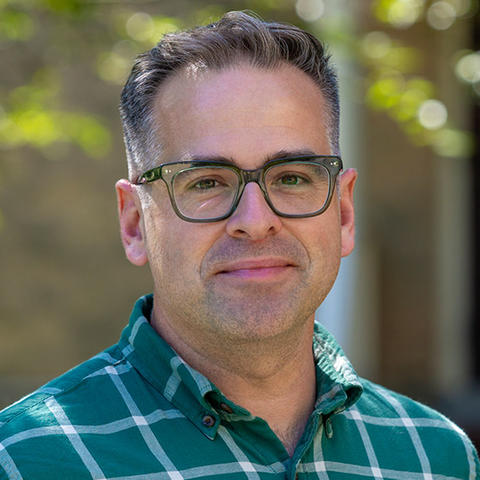BuddyUp Offers New Ways to Connect with Fellow Fords

Ankith Suhas Pinnamaneni ’23, Justin Reed ’24, and Samanyu Kurra ’24 are the team behind BuddyUp. Photo by Patrick Montero.
Details
The new app, developed by three recent alums through Haverford's Innovation Program, is being piloted on campus this fall.
With moving away from home, the rigor of classes, and the pressure of choosing a major, the transition to life on a college campus can be challenging for first-year students. It’s made harder still by the need to form new social bonds with unfamiliar people who may or may not share interests. A new app created by Samanyu Kurra ’24, Ankith Suhas Pinnamaneni ’23, and Justin Reed ’24 hopes to change that.
Called BuddyUp, which Kurra describes as “pseudo-social media,” it functions much like a communal bulletin board. Students can anonymously share their interest in upcoming events — like, Kurra jokes in his pitch for the app, a Celine Dion concert — and find others on campus who might also be interested in attending. The BuddyUp experience begins anonymously, which helps alleviate any feelings of awkwardness. Once there’s mutual interest, users can chat directly to coordinate event details in an event-specific group chat.
BuddyUp arrives at a time when more than 50% of young people have reported intense feelings of loneliness, prompting U.S. Surgeon General Vivek Murthy to declare an epidemic of loneliness and isolation last May.
“The main problem that we want to solve is how technology can foster and further friendships,” Reed says. “Social media isn’t doing enough currently. It’s called social media, but when you use it, you’re being anything but social. We want to get college students meeting up and making new friends in real life.”
Kurra, Pinnamaneni, Reed, and BuddyUp’s development were all supported by the Haverford Innovation Program’s (HIP) Summer Incubator this year. Every summer, HIP supports two to three teams of students or recent alums each year and provides the necessary financial backing, resources, and mentorship required to tackle a problem or need of their choosing. Through the incubator, the team developed several app prototypes and returned to campus to gather feedback from current students.
“We had three different versions that we asked people to try,” says Pinnamaneni. “We presented them with several tasks and asked them how they would go about it. That feedback helped inform our designs.”
In its current iteration, BuddyUp allows users to share both ideas and concrete plans, says Pinnamaneni. It also includes multiple layers of visibility so users can make those plans available to immediate friends or broader social networks, like friends of friends. It differs from existing platforms like Meetup, Lynkr, and UNBLND, he says, because it’s genuinely focused on developing connections for college students through mutual interests in specific experiences.
Kurra says he first got the idea for the app when he returned to campus after a COVID-prompted gap year. With venues open again, he was very interested in seeing Canadian indie pop band Peach Pit perform in Philadelphia but couldn’t find anyone to go with him.
“The band is a little niche, so none of my friends were all that interested in going,” he recalls. “I didn’t want to go alone, so I didn’t go. But the next morning, I saw an Instagram post from a mutual friend from Haverford who did go. Maybe we could have buddied up and gone together. That would have been a nice possibility.”
What’s worse, Kurra says, is that said mutual friend snagged a photo with Peach Pit’s lead singer after the show.
Beyond concerts, BuddyUp offers potential friends the opportunity to try new restaurants or, as a video on BuddyUp’s Instagram suggests, set up a watch party for the final match of the Copa America soccer tournament. In addition, Pinnamaneni says, the team sees opportunities for college students, always looking to save money, to minimize costs during the academic year. For instance, he says, BuddyUp could be used to carpool or rideshare for trips to the airport during fall and spring break.
For now, BuddyUp is in the first phase of its implementation and will remain available only to those with a .edu email address, much like Facebook in its earliest days. It has become Kurra’s full-time interest while Pinnamaneni (on a gap semester working on BuddyUp full-time) and Reed complete their graduate studies in computer science at the University of Pennsylvania. Haverford students are currently testing it while the team continues to think about scaling it to accommodate larger campuses across the country.
Haverford students are currently testing it while the team continues to think about scaling it to accommodate larger campuses across the country.




